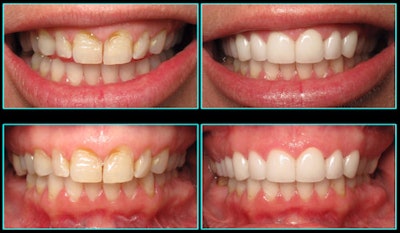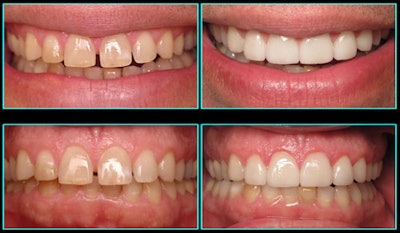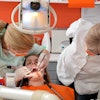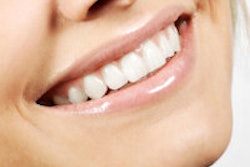
Every Halloween, jack-o-lanterns are eye-catching and, to say the least, interesting. These expressive pumpkins bring us all enjoyment. The carved masterpieces have transformed over the years from simplistic designs with smiles to intricate graphic art pieces.
Why do jack-o-lanterns fascinate us, and why are we drawn to them? How do they hold our interest and mesmerize us? Is it the diversity in their expressions, for example, their toothless, jagged, or checkerboard smiles? Their grins can tell us something about society and our responses to smiles.
 Tanya Brown, DMD.
Tanya Brown, DMD.
In the same way that jack-o-lanterns hold our interest and entertain us, a person's smile makes an impression on us. A smile can light up a room when someone enters it. A certain level of confidence is portrayed with someone who has a vibrant, attractive smile. This is where modern cosmetic dentistry comes to the forefront. When patients enter our offices with smiles that are less than ideal, we have the perfect opportunity to transform their lives. It is no laughing matter when oral conditions cause health problems or confidence issues.
Here are a few examples of patients that were unaware of the possibilities for their smiles. After spending some time listening to them, developing some possible solutions, and discussing these options with them, these patients said "yes" to a more attractive smile.
Sample case 1: This patient had severe erosion on her front teeth and wanted to improve her smile. Due to her extensive tooth structure loss and existing composite restorations, she had porcelain crowns placed to restore her aesthetics, function, and structure to her teeth.

Sample case 2: This patient had a diastema and interproximal spaces and always felt uncomfortable with his smile. He decided to professionally whiten his natural teeth and restore his maxillary anterior teeth with conservative porcelain veneers on Nos. 7 to 10. This eliminated the diastema and improved his aesthetics and structure.

Trust is key
So if cosmetic and restorative dentistry are the solution, how do you help your patients become aware of the solution without scaring them or overwhelming them? There are three main components to the process of a patient saying "yes": building a relationship based on trust, helping them to improve their smiles, and maintaining their smile.
First, establishing a relationship and building trust with the patient are key to any successful dental practice. Building trust is accomplished by reassuring patients from the beginning that they are in good hands. Talking with them about what they can expect at their appointment alleviates many patient's concerns, anxiety, and fear, which builds trust. The most successful practices make time in their busy schedule to educate their patients. It is important for their patients to feel they are being heard.
The second component to the patient saying yes involves diagnosing, treatment planning, and case acceptance. How do you help patients make a change in their smile? What is the best way for them to understand and commit to your recommendations? Most often, when given the proper information, the patient will make the best choice for their oral healthcare. Presenting treatment plans with different options and working within the patient's budget makes it easier for them to say yes. The value of an improved smile cannot be underestimated. Seeing is believing.
One easy way to help patients see what you see is by using digital and intraoral photography. Photography is a powerful tool that allows patients to become aware of their conditions and possible solutions without overwhelming them. Showing actual patient cases with before and after pictures will make it easier for your patients to visualize a new smile. This type of photography is extremely valuable in helping patients accomplish their oral health goals and improving their smile. An excellent marketing tip that many successful practices engage in is to use photos of patients' new smiles in a marketing brochure or pamphlet. What better way to show your patients how much you care, than by starting a brag book and placing it in the reception room so others can see?
Finally, maintaining patients' new smile and promoting their new look are the last steps in the cosmetic and restorative process. Their periodontal health and wellness becomes a vital part of their long-lasting results. Many times, this is accomplished in your hygiene department with continuing care visits on a semiannual basis. These continuing care visits give patients an opportunity to maintain their oral health and detect small problems before they become dental emergencies.
Creating healthy, attractive smiles is a very rewarding process for the patient, as well as the dentist and dental team. Just remember when you see a jack-o-lantern this fall that you have an opportunity to help create healthy, attractive smiles for your patients! Give your patients an opportunity to say "yes," and they will make you smile.
Dr. Tanya Brown founded and actively practices at the Center for Cosmetic & Restorative Dentistry in Chesapeake, VA. She works with dentists and dental teams who want to "Connect the Dots" to be more focused, more productive, and have more fun!
Contact Dr. Brown for a complimentary copy of her five-minute photo guide. She can be reached at [email protected].



















